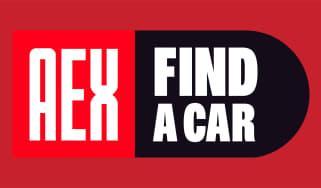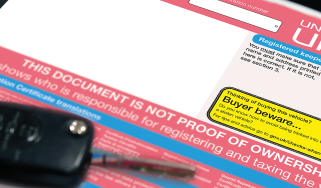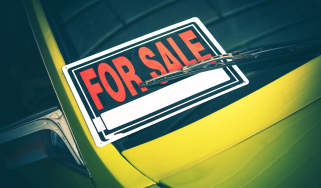How to SORN your car with the DVLA and avoid hefty fines
Taking your car off the road? You’ll need to abide by the 'SORN’ laws. Our guide explains all
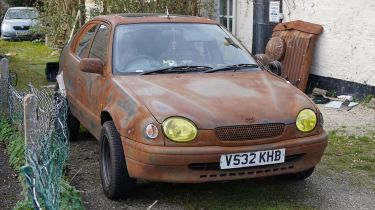
If you’re planning on taking your car off the road and not using it for an extended period of time, you’ll need to ‘SORN’ it with the Driver and Vehicle Licensing Agency (DVLA). SORN stands for ‘Statutory Off Road Notification’ and by declaring your car as SORN, you’re notifying the DVLA that the car won’t be kept, or driven, on the road.
Failure to inform the government that a car is off the road can lead to an automatic fine if you don’t pay your VED road tax, so it’s important to make sure you know how to declare a car SORN. To qualify for ‘SORN’ your car must be kept on private land or in a garage and not driven on the road. This guide will take you through the process of how and when to SORN a car.
Applying to SORN a car with the DVLA is a straightforward process and is the responsibility of the vehicle's registered keeper. Once you have notified the government that the car is off the road and no longer in use, you won’t need to pay any road tax or have any car insurance policy in place. Bear in mind, however, that without insurance it won’t be covered in case of theft or damage.
Once you SORN your car, you’ll be sent a refund cheque from the DVLA for any road tax that you’re owed. It’s illegal to drive a car on public roads after declaring it SORN. If you do, you could risk big fines or even have your car seized if spotted by the police, DVLA or an ANPR camera.
The easiest way to declare your car as SORN is through the DVLA website, this can be done free of charge at any time. If you don’t have access to the internet, you can notify the DVLA by post (via a V890 form) or over the phone by calling 0300 123 4321. Standard call and postage charges will apply.
How to SORN a car
Apart from the car’s registration number, and make and model info, you’ll need the 16-digit reference number from your V11 car tax renewal reminder or the 11-digit reference from the car's V5C logbook. The DVLA website will tell you where to find these and guide you through the process. Make sure you read the rules, though, so you know what you are promising when you make the declaration. You can SORN your car:
- Online: You can declare your car SORN straight away by visiting www.gov.uk/make-a-sorn.
- By post: Use form V890 (available from the Post Office or DVLA website) and mail it to the DVLA, Swansea, SA99 1AR.
- By telephone: Call the DVLA on 0300 123 4321.
Whichever way you declare SORN, you should receive an acknowledgement letter from the DVLA within four weeks. If you do not receive this letter, give the DVLA a ring to check that your SORN has been successfully processed.
Why would I need to SORN a car?
In the UK, when someone owns a car it must be insured and taxed by default. Even if it hasn't been taxed or insured, the government will still assume a car is in use on UK roads unless it has been declared as SORN. This notifies the DVLA that the car is not in use on public roads. If your car is uninsured or untaxed, for whatever reason, take it off the road immediately and make a SORN declaration to the DVLA. If the government catches your car on the road without tax or insurance, you could incur severe penalties.
When you must make a SORN declaration
- If you buy a car and do not tax and insure it immediately. (VED road tax no longer transfers with a car to its new owner, but is refunded to the car’s vendor at the time of sale.)
- If you buy a car that has already been recorded as SORN by the previous owner. (SORN declarations are not transferable, so you must immediately make a fresh declaration as the new owner.)
- If your road tax expires and your car is off the road for more than 14 days.
- If your car does not have valid insurance.
- If you are scrapping a car.
How long does a SORN last?
Once you declare your car as SORN, this lasts as long as you need it to, so there’s no need to renew it as long as you’re keeping your car off the road. However, if you sell your car while it is SORN, this won’t transfer to the new owner and they will have to make a new SORN declaration.
How to cancel a SORN declaration and get a car back on the road
If you decide that you want to start driving your car again, all you need to do is tax and insure your car and the SORN will be cancelled automatically. Taxing a SORN’d car is easy as you simply follow the same procedure that you would for a car that is running out of VED road tax. You can do it online, at a post office or over the phone.
If your car has been off the road for a long time, it may also need a fresh MoT in order to legally and safely return to the road. A service will keep it in fine mechanical fettle, too.
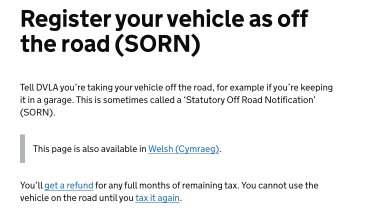
Cars built more than 40 years ago won’t need an MoT test officially, but we still recommend that you get it professionally checked anyway to make sure it’s safe to be used on the road.
It’s worth noting that if you are driving to the MoT test station (you are allowed to drive an unMoT’d and/or untaxed car to a pre-booked test), make sure you have the correct insurance to cover your journey and have checked that your tyres, brakes, steering and lights are still in working order before heading out on the road.
Our Car Tax Checker tool lets you check your tax status and renewal date in seconds. Check your VED car tax now...
Can I SORN a car without the V5C logbook?
To SORN a car, you’ll need the 11-digit reference from the car's V5C logbook. If you don’t have a V5C logbook, you’ll need a new one before you can SORN your car. To do this, you’ll need to fill out a V62 form along with your V890 form. There is a £25 fee for a new logbook.
Can I SORN a car and park it on the street?
No, you cannot SORN any vehicle that is parked on the street, as it would technically be using the road. This includes street parking in front of residential properties. A SORN car must be parked in a garage or on private land.
Is it illegal to drive a car that's SORN?
It may occasionally be tempting to take a SORN vehicle for a spin – for example, if it’s been off the road for extended repairs and you want to road-test it, or you’ve just got back from an extended stay overseas.
However, unless you are on your way to a pre-booked MoT or other government checks, this is against the law. If you are caught, the authorities will take a very dim view. You could face prosecution and a fine of up to £2,500.
What happens if you don’t SORN a car?
If you fail to make a SORN declaration, the DVLA will know when your road tax expires, and the organisation can cross-reference with the national insurance database to find out which vehicles do not have valid cover.
A warning letter will be sent, and if you fail to take action, an automatic fixed penalty fine will be issued by post – it’s £80 if your road tax has expired (reduced to £40 if you pay within 28 days), or £100 if your car is uninsured.
If you fail to settle-up, you’ll be facing court prosecution, at which point magistrates could raise the fine to £1,000 - plus court costs - for either tax or insurance.
Don’t rely on the DVLA sending you a warning letter though, as they’re not actually obliged to do so. Even if you think you should have had a letter but it hasn’t arrived, you’re still responsible in law for the offence and liable to be fined.
Our dealer network has 1,000s of great value new cars in stock and available now right across the UK. Find your new car…
Find a car with the experts



